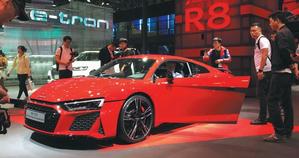 An Audi R8 attracts attention at the Shanghai auto show in 2019. (LI FUSHENG / CHINA DAILY)
An Audi R8 attracts attention at the Shanghai auto show in 2019. (LI FUSHENG / CHINA DAILY)
Car dealers in China are trying to win back showroom traffic now the coronavirus has been curbed, but one problem is that more than 40 percent of potential buyers disqualify a brand without visiting its showroom, according to a JD Power survey.
Those who remove a brand from their wish list without visiting a dealership increased to 43 percent of 23,151 car owners polled between November 2019 and April 2020, by the China Sales Satisfaction Index Study
Those who remove a brand from their wish list without visiting a dealership increased to 43 percent of 23,151 car owners polled between November 2019 and April 2020, by the China Sales Satisfaction Index Study.
The study, now in its 21st year, measures customer satisfaction of the purchase experience among new-vehicle buyers and rejecters, defined as those who consider a brand seriously but ultimately choose another brand.
Those polled purchased their vehicles between May 2019 and February 2020 across 70 Chinese cities. Sales in those cities account for roughly 65 percent of total vehicle sales in the country.
According to the study, 24 percent reject a brand when searching vehicle information online, compared with 6 percent in 2017. Those who reject a brand in pre-visit communications with dealers increased to 19 percent from 4 percent in 2017.
Products are the main reasons for customer loss in pre-visit phases. For example, features of the model do not meet expectations, vehicles do not look good or fewer variants are available.
"Customers are likely to make less informed decisions if they do not have hands-on experience with vehicles," said Eileen Ren, vice-president of digital customer experience at JD Power China.
"That is why dealers need to help customers get a better understanding of the vehicle in pre-visit communications by asking their requirements and inviting them to take a test drive and prevent them from making hasty decisions," said Ren. How a potential customer feels at a dealership is vital to a customer's final purchase decision. According to the survey, it is as important as price (16 percent), although car quality is the decisive factor (30 percent). Other factors include brand and design.
It also makes a difference to the customer if the salesperson is professional enough or whether he or she is honest and fair when asked about cars from rival companies.
ALSO READ: BMW, Alibaba to build innovation base to foster, incubate startups
Ren said as the automotive market in China is slowly recovering from the COVID-19 pandemic, automakers and dealers need to concentrate more on the customer purchase experience to fully demonstrate the advantages of vehicle quality and design, in order to drive purchase decisions.
"Automotive brands and dealers that make continuous investments in products and services are likely to win a larger market share after the pandemic," she said.
Other findings show that customer satisfaction has improved, with the gap between premium brands and volume brands narrowed.
Audi ranked first among premium brands, winning a score of 760 on a 1,000-point scale, while GM's Buick tops the list of volume brands with a score of 722.
Customer satisfaction with Chinese brands is improving as well. The gap between domestic brands and the industry average has shrunk to 9 points in 2020 from 22 points in 2018.
Vehicle buyers under the age of 30 now account for 32 percent of the total, becoming the largest customer group. Those over 40 account for a 17 percent share.
The young are also the focus of almost all automakers and dealers: they are offering more glitzy and sportier vehicles.
This age group is the most satisfied with their experience, according to the survey.
READ MORE: Pandemic speeds up change in country's auto market
JD Power also suggests carmakers and dealers should pay more attention to the trade-in business. It found that the number of vehicle owners who are interested in trade-in services in 2020 is more than three times that of 2017.
Dealer recommendations on trade-in services can effectively make customers more willing to trade in their vehicles, which can help secure the final deal price as well as promote the used-vehicle business, said JD Power.


